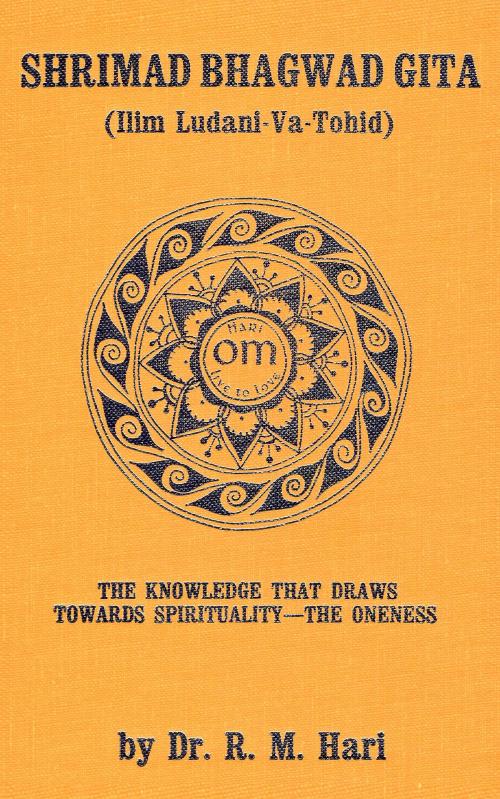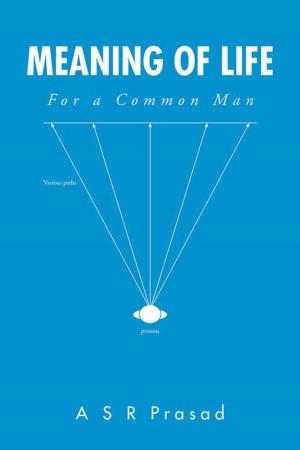Shrimad Bhagwad Gita
The Knowledge That Draws Towards Spirituality - The Oneness
Nonfiction, Religion & Spirituality, Inspiration & Meditation, Spirituality| Author: | Dr. R. M. Hari | ISBN: | 9780985098827 |
| Publisher: | H. M. Damodar | Publication: | September 5, 2012 |
| Imprint: | Language: | English |
| Author: | Dr. R. M. Hari |
| ISBN: | 9780985098827 |
| Publisher: | H. M. Damodar |
| Publication: | September 5, 2012 |
| Imprint: | |
| Language: | English |
Shrimad Bhagwad Gita has been translated and interpreted by many able persons in almost all the languages all over the world. Every scholar has done his best according to his mental stature and experiences to present his commentary for the benefit of others. Many sages have also commented upon this sacred book from time to time, hence this holy book is known all over the world. I hope by the grace of Lord Krishna, this book will also find its place in the minds of the enthusiasts. Studied with keen interest, it will serve as a perfect guide for material as well as spiritual progress. The approach adopted in this book is unique—to show that the Truth (Atma—Haq) is one and the same everywhere, at all times and in all religions, because truth is that which has no changeableness. Special reference has been made to Sufism to show that there is no difference between Vedanta and Sufism or other religions and the apparent differences among them are because of semantic reasons. The blessed personalities of all religions who have dived deep into the spiritual realm (Atam Gyan—Ilim Ludani) have expressed and established the truth of oneness (non-duality). The ignorant fanatics tied down in the shackles of wordiness of religion have been criticising other religions without understanding the real meaning of the Truth which is identical in every religion. One sage has said, "He who sticks to words only, shall not rise to the climax." Fanaticism has really deprived us of Atamanand—the Bliss and has plunged us into materialism instead of spiritual bliss and thus put us in consternation. To simplify every chapter, a chart has been provided at the beginning to show the number of verses and the salient points. The reader must study the chart first to grasp the spirit of every chapter and also know that basically there is no difference between Vedanta and Sufism except in the language. Sufistic equivalents have also been given. Honest understanding of Truth will reveal that Vedanta is in no way at variance with any other religion. The disciplines set forth for the aspirants are also identical. The unprejudiced seeker of the truth will find solace in this book, irrespective of his caste and creed. Before proceeding, it is very essential to give the true meaning of the word Sufi. Sufi is he who enjoys the eternal bliss of oneness (non-duality). The word Sufi is not a monopoly of any particular caste or creed. It is of Arabic origin and can be attributed to anybody having the qualities of a sufi. The word Sufi has been derived from the Arabic word Suf, meaning wool. During olden times, the seekers of the truth used to put on woolen clothes because such people did not believe in physical comforts; wool pricked their bodies and kept them conscious of devotion and love for the truth; so the persons who wore woolen clothes were considered sufis, the men of austerity. The word Sufi is also idiomatically used by many sages, meaning that the person is in constant communion with God. The word Suf also means liberation, therefore Sufi is he who has renounced all worldly pleasures for the sake of his liberation. Sufi also means pure. He who lives pure, eats pure, and is pure in thought and deed is a real sufi, whatever be his caste or creed. A great Sufi has very clearly depicted the qualities of a sufi and not of the religion, as given below: THE QUALITIES AND LIVING OF A SUFI Sufi is he who knows the truth, Loses his ego and merges in Guru, Knows not religions, sees one in all, Kindles the fire of love and burns his ego, Transforms with word and thought, In Turiya (Lahoot) finds his abode. Neither hurts nor is hurt, Finds the self in everyone, Transforms ego into Self, Forgetting manifestations, Outer inner lives so pure, Pains and pleasures feels the same, Finds the self in the Self, Speaks of unseen, Always remains in devotion...
Shrimad Bhagwad Gita has been translated and interpreted by many able persons in almost all the languages all over the world. Every scholar has done his best according to his mental stature and experiences to present his commentary for the benefit of others. Many sages have also commented upon this sacred book from time to time, hence this holy book is known all over the world. I hope by the grace of Lord Krishna, this book will also find its place in the minds of the enthusiasts. Studied with keen interest, it will serve as a perfect guide for material as well as spiritual progress. The approach adopted in this book is unique—to show that the Truth (Atma—Haq) is one and the same everywhere, at all times and in all religions, because truth is that which has no changeableness. Special reference has been made to Sufism to show that there is no difference between Vedanta and Sufism or other religions and the apparent differences among them are because of semantic reasons. The blessed personalities of all religions who have dived deep into the spiritual realm (Atam Gyan—Ilim Ludani) have expressed and established the truth of oneness (non-duality). The ignorant fanatics tied down in the shackles of wordiness of religion have been criticising other religions without understanding the real meaning of the Truth which is identical in every religion. One sage has said, "He who sticks to words only, shall not rise to the climax." Fanaticism has really deprived us of Atamanand—the Bliss and has plunged us into materialism instead of spiritual bliss and thus put us in consternation. To simplify every chapter, a chart has been provided at the beginning to show the number of verses and the salient points. The reader must study the chart first to grasp the spirit of every chapter and also know that basically there is no difference between Vedanta and Sufism except in the language. Sufistic equivalents have also been given. Honest understanding of Truth will reveal that Vedanta is in no way at variance with any other religion. The disciplines set forth for the aspirants are also identical. The unprejudiced seeker of the truth will find solace in this book, irrespective of his caste and creed. Before proceeding, it is very essential to give the true meaning of the word Sufi. Sufi is he who enjoys the eternal bliss of oneness (non-duality). The word Sufi is not a monopoly of any particular caste or creed. It is of Arabic origin and can be attributed to anybody having the qualities of a sufi. The word Sufi has been derived from the Arabic word Suf, meaning wool. During olden times, the seekers of the truth used to put on woolen clothes because such people did not believe in physical comforts; wool pricked their bodies and kept them conscious of devotion and love for the truth; so the persons who wore woolen clothes were considered sufis, the men of austerity. The word Sufi is also idiomatically used by many sages, meaning that the person is in constant communion with God. The word Suf also means liberation, therefore Sufi is he who has renounced all worldly pleasures for the sake of his liberation. Sufi also means pure. He who lives pure, eats pure, and is pure in thought and deed is a real sufi, whatever be his caste or creed. A great Sufi has very clearly depicted the qualities of a sufi and not of the religion, as given below: THE QUALITIES AND LIVING OF A SUFI Sufi is he who knows the truth, Loses his ego and merges in Guru, Knows not religions, sees one in all, Kindles the fire of love and burns his ego, Transforms with word and thought, In Turiya (Lahoot) finds his abode. Neither hurts nor is hurt, Finds the self in everyone, Transforms ego into Self, Forgetting manifestations, Outer inner lives so pure, Pains and pleasures feels the same, Finds the self in the Self, Speaks of unseen, Always remains in devotion...















